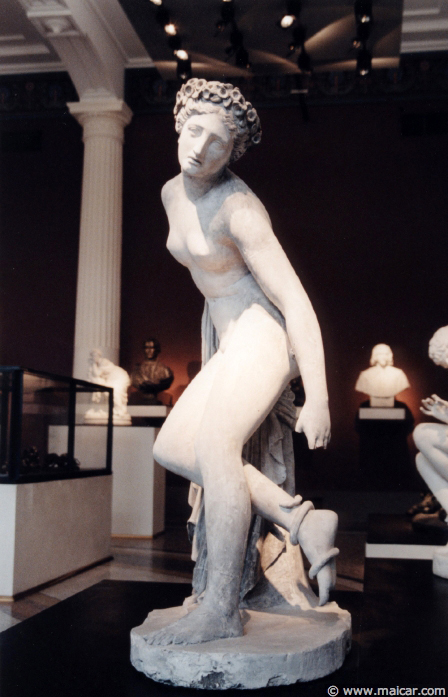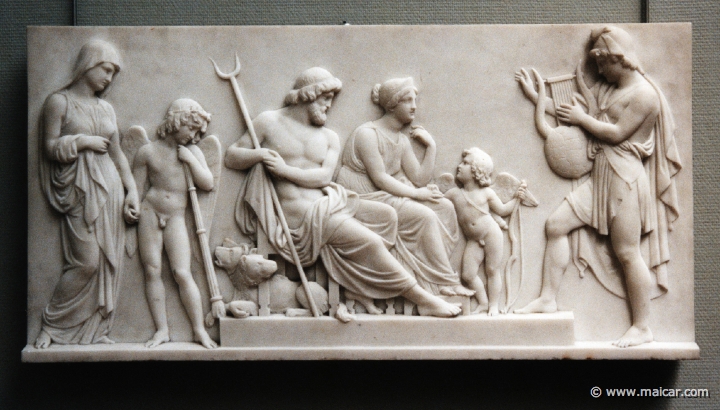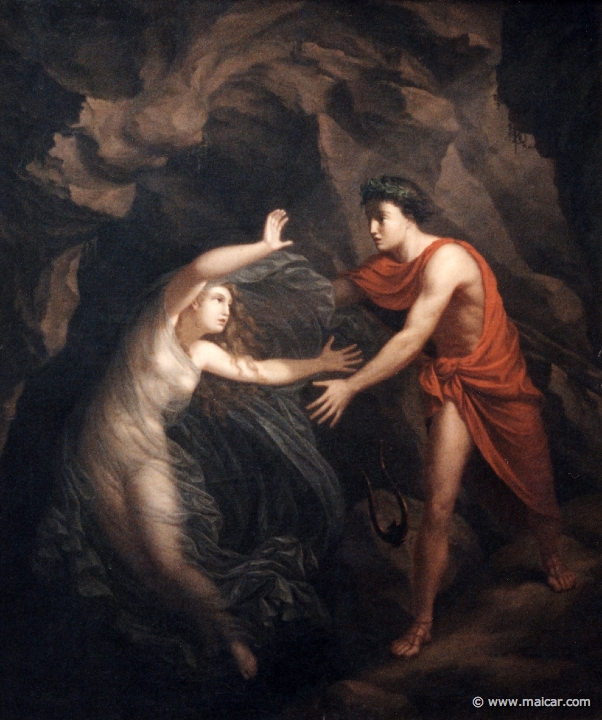|

|
The serpent biting Eurydice 5.
4302: Charles Nanteuil 1792-1865: Eurydice mourante. Musée de Picardie, Amiens.
|
|
Orpheus, king of the Ciconians, is counted
among the ARGONAUTS.
Orpheus practised minstrelsy and by his songs moved
stones and trees, holding also a spell over the
wild beasts. He descended to the Underworld in order to fetch his dead wife, but had to return
without her.
Orpheus loses his wife
Orpheus, whom Apollo taught to play the lyre, traveled to Egypt where
he increased his knowledge about the gods and their
initiatory rites, bringing from that country most
of his mystic ceremonies, orgiastic rites, and his
extraordinary account of his descent to the Underworld. Orpheus became famous because of his poems and
his songs, excelling everyone in the beauty of his
verse and music. He also reached a high degree of
influence because he was believed to have
discovered mysteries, purification from sins, cures
of diseases, and means of averting divine wrath. Some say that Orpheus introduced a cult of Dionysus 2 that was
very similar to the cult of Osiris, and that of Isis, which resembles the
cult of Demeter. But
others affirm that he praised all the gods except Dionysus 2. The Aeginetans worshiped Hecate, and in her honor
celebrated every year mystic rites which, they
said, had been taught to them by Orpheus. And the
Lacedaemonians asserted that it was Orpheus who had
taught them the cult of Demeter Chthonia (of the Lower World). Orpheus married Eurydice 5, but she, while strolling through the grass with a group of naiads, was smitten in the ankle by a serpent, which shot its poison into her body and killed her. Having mourned her to the full in the upper
world, Orpheus decided to fetch her, and for that
purpose he descended to Hades through the gate of Taenarus. Having descended to the Underworld, Orpheus
accompanied his words with the music of the lyre,
and it is told that not only the spirits wept but
that also the ERINYES were wet with tears. He also entranced Persephone by his
songs, and persuaded her to help him in his desire
to bring back to life his dead wife. And so even Hades himself was
persuaded to let her go.
Orpheus loses his wife again
However, the god promised to do so only if on
the way up Orpheus would not turn round until he
came to his own house. But thoughtless Orpheus
forgot, and when he turned round and looked at his
wife, she instantly slipped into the depths again.
In this manner Orpheus lost her a second time.
Some read the story thus:
"To you this tale
refers,
Who seek to lead your mind
Into the upper day;
For he who overcome should turn back his gaze
Towards the Tartarean cave,
Whatever excellence he takes with him
He loses when he looks on those below."
(Boethius, Consolation
of Philosophy 3.52).
|

|
Hades and Persephone listen to Orpheus' song in the Underworld.
5132: H. W. Bissen, 1798-1868: Orpheus pleading with Pluto and Proserpina to restore Eurydice to him. Ny Carlsberg Glyptotek, Copenhagen.
|
|
Some have thought that through his descent to
the Underworld,
Orpheus performed a deed full of courage inspired
by love.
Not willing to die
But others point out that Orpheus did not
receive his wife back, because his attempt was the
quest of a coward, who was not willing to die for
her but entered the Underworld alive, and
alive he left both Underworld and wife,
who in that way died twice. And as they reason
thus, they have in mind Alcestis, who was
allowed to return from the Underworld for having
willingly died for love of her husband.
Death of Orpheus
Some affirm that Orpheus was torn in pieces by
the MAENADS, but others
say that he committed suicide out of grief for the
death of his wife. Still others assert that Orpheus
came to his end by being struck by a thunderbolt,
hurled at him by god because he revealed sayings in
the mysteries to men who had not heard them before.
Yet others say that because Orpheus first favored
love for youths, he seemed to insult women, and for
this reason the latter killed him.
Aphrodite,
Calliope, Dionysus 2, Apollo
Concerning the MAENADS or women who
killed him, some say that when Aphrodite and Persephone were both
in love with Adonis,
Orpheus' mother Calliope was then appointed judge
by Zeus, and she decided
that each should possess him half the year. Aphrodite then, angry
at the decision, stirred all the women in Thrace
with love, each to seek Orpheus for herself, so
that they tore him limb from limb. But some affirm
that these women were instigated by Dionysus 2, who was angry against Orpheus because he had looked into the rites of the god. His head fell into the sea and was cast by the waves upon the island of Lesbos where the Lesbians buried it, and for having done this the Lesbians have the reputation of being skilled in music. In the island of Lesbos, they say, Orpheus had a
shrine where oracles were given until Apollo, the god of
prophecy, rebuked him:
|

|
Orpheus losong his wife while leaving the Underworld. 5125: Orpheus and Eurydice. Painting from 1806 by C. G. Kratzenstein-Stub, 1793-1860. Ny Carlsberg Glyptotek, Copenhagen.
|
|
"Cease to
meddle with my affairs, for I have already put up
long enough with your vaticinations." (Flavius Philostratus, Life
of Apollonius of Tyana 4.14).
Women and wine
It is also told that the Thracian women plotted
Orpheus' death, because he had persuaded their
husbands to follow him in his wanderings, and that
first after having drinking much wine, they dared to kill
him. This is the reason why their husbands
hereafter adopted the custom to march to battle
drunk.
River remembered him
Some believe he was killed near Mount Pieria,
and close to this place an urn was preserved, which
was said to contain the bones of Orpheus. It is
also told that when the women who killed Orpheus
wished to wash off in a river the blood-stains, the
river sank underground, not wishing to lend its
waters to cleanse manslaughter.
Bones and nightingales
It is told that the city of Libethra had
received an oracle concerning the bones of Orpheus,
which stated that when the sun should see his bones
the city would be destroyed by a boar. Nobody
believed a boar able to cause such a huge
destruction, but when one day by accident the urn
fell and broke exposing the bones, that same night
came a heavy rain, and the river Sys (Boar), one of
the torrents about Olympus, destroyed the walls of
Libethra, overturning sanctuaries and houses, and
drowning the inhabitants and all the animals in the
city.
The Thracians used to say that the nightingales
that build their nests on the grave of Orpheus sing
more sweetly than others.
Constellation Lyra
It has also been said that Orpheus' scattered
limbs were gathered by the MUSES, who buried them and
put the Lyre among the constellations as a
memorial.
|